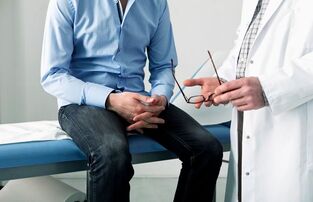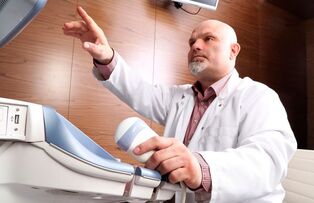Prostatitis is an inflammation of the prostate gland, mainly diagnosed in people over the age of 35-45. Such a disease can develop only in men, because the female body does not have a prostate gland. Why does the disease occur and what factors contribute to its development? How can prostatitis be treated and what are the risks of complications?
Prostatitis in men
Given the disappointing statistics, the incidence of prostatitis is on the rise. Today, prostatitis affects almost half of the entire male population between the ages of 30 and 70. It should be noted that prostatitis will develop if not treated properly. Failure to see a doctor in time is fraught with negative consequences in the form of complications: pancreatic abscess or infertility.
The prostate gland is a round organ located under the bladder and is involved in the formation of sperm (seminal fluid). During ejaculation, the muscles of the prostate contract and prevent sperm from entering the bladder and urine into the semen. Disorders of the pancreas can lead to male infertility.
There are several classifications of prostatitis, distinguish:
- acute inflammation of the prostate gland;
- chronic bacterial and non-bacterial prostatitis;
- asymptomatic disease.
Inflammation of the prostate is often accompanied by vesiculitis or urethritis (inflammation of the urethra).
Acute prostatitis
The acute form of the disease usually occurs spontaneously and is accompanied by numerous unpleasant symptoms. This situation requires urgent medical attention. Staphylococci, Pseudomonas aeruginosa or Escherichia coli and enterobacteria can cause an acute inflammatory process. Some microorganisms are part of the normal microflora, but can enter the prostate gland and cause tissue inflammation.
There are several types of acute inflammation:
- catarrhal;
- parenchyma;
- follicular;
- organ abscess.
Acute prostatitis is easily diagnosed by an experienced doctor using modern laboratory tests. Severe symptoms and a typical clinical picture will make it possible to make a quick and accurate diagnosis. Treat the acute form of the disease thoroughly. Initially, an antibiotic is used to eliminate the pathogenic infection. Effective therapy also includes: drugs that strengthen the immune system, drugs that improve blood circulation in the pancreas, and physiotherapy procedures if necessary. However, the benefits of massage for prostatitis have not been proven.
Chronic bacterial prostatitis
Chronic prostatitis of bacterial etiology is a disease characterized by the prostate gland. Symptoms of the disease include pain syndrome, urinary incontinence, psychological distress. Inflammatory changes can also occur in body fluids, including glands, semen, and urine. Chronic bacterial prostatitis always has a pathogenic agent identified using multi-level laboratory tests.
Infectious prostatitis is most often associated with microorganisms of the genus Enterobacteriaceae. The main causative agents of prostatitis are Trichomonas, ureplasma, gonococcus, mycoplasma, chlamydia, gardnerella. Inflammation can be caused by Mycobacterium tuberculosis or Candida fungi if a man is infected with HIV. Other pathogenic microorganisms, including Klebsiella, Proteus, and Enterococcus, cause the disease.
Chronic non-bacterial prostatitis
Chronic non-bacterial prostatitis may have signs of inflammation or may be almost asymptomatic. Only a qualified urologist can diagnose and diagnose the disease based on the results of a complete diagnosis of the patient's condition.
Inflammatory prostatitis
Chronic non-bacterial prostatitis with signs of inflammation can be diagnosed based on the complaints of patients and the results of laboratory tests. After prostate massage, an increased content of leukocytes is found in the secretion of the gland. Pathogenic microorganisms are not detected.
Non-inflammatory prostatitis and chronic pelvic pain syndrome
If the urologist does not detect an infection at the time of diagnosis, the diagnosis may sound like non-inflammatory prostatitis. In this case, the main symptom of the disease is persistent / recurrent and long-term pain in the pelvic region. Such an unpleasant syndrome can be bothersome for 2-4 months.
Asymptomatic chronic prostatitis
Asymptomatic chronic prostatitis has virtually no symptoms. This type of inflammation of the pancreas persists without visible symptoms. The doctor may diagnose the problem due to the periodic or constant secretion of leukocytes and bacteria in the urine. This form of the disease is treated with non-steroidal anti-inflammatory drugs and antibiotics.
As shown in practice, the symptoms of inflammation of the prostate tissue can be easily confused with other pathologies affecting the pelvic organs. Self-medication can lead to complications, the development of additional diseases, or critical conditions.
Causes of prostatitis in men

It is impossible to talk about the only cause of inflammation of the prostate gland, because the disease is multifactorial and can appear in the background of different situations. Distinguish between hormonal disorders, hypothermia, significant reductions in immune defenses, circulatory disorders, STD infections, and sexual abstinence.
Infectious
Pathogenic microorganisms can enter the prostate gland during inflammation of the bladder and urethra. The infection can also enter the prostate due to hematogenous routes, such as purulent foci (in tonsillitis, pneumonia or furunculosis). Affecting agents may be: Escherichia coli, staphylococci and enterococci.
Symptoms of prostatitis are often caused by sexually transmitted diseases. Inflammation of the prostate gland occurs due to an infection that affects the tissues of the body. Acute prostatitis can be caused by a herpes virus or a mycoplasma infection that does not only affect the reproductive system. Chlamydia is also worth mentioning. Gram-negative intracellular microorganisms cause about 40-60% of all urogenital infections.
The secret of the pancreas contains bactericidal substances that prevent the development of infections inside the body. Additional factors, including stagnation in the circulatory system of the small pelvis or stagnation of glandular secretion, are needed for the spread of infection and the occurrence of an inflammatory process.
Hypothermia, in which the activity of immune cells and the protective functions of the mucous membrane are significantly reduced, may be associated with factors that contribute to the spread or activation of the infection. This includes a lot of physical and neuropsychic work that negatively affects immunity.
Non-infectious
There are several non-infectious causes of tissue inflammation in the prostate gland. Symptoms of prostatitis may appear due to a violation of the mechanics of the whole process of urination, because urination is carried out due to the periodic relaxation of the circular muscles of the prostate and bladder. Various disorders of this process, including failures associated with variability in muscle activity (tissue tension and contraction), contribute to the entry of urine into the prostate ducts. This condition can adversely affect the body, causing irritation and eventually prostatitis symptoms.
Unnatural stretching, disconnection, or prolonged abstinence can lead to symptoms or the development of prostatitis. Stagnation and swelling of the prostate gland can cause a secretion that is fully formed in the gland, but is not removed from the body or partially discarded.
Circulatory disorders and sedentary lifestyle
Close-fitting underwear, a tight belt, tight pants and shorts, and a sedentary lifestyle can disrupt blood circulation in the pelvis. The pancreas fills with blood, there is constriction of blood vessels, the transport of nutrients is delayed. Such changes lead to gland failure.
Hormonal Disorders
The amount of sex hormones plays a special role in the work of the prostate gland. They can affect the activity of prostate cells. And hormonal overload can increase the risk of prostatitis symptoms.
The prostate gland is involved in stabilizing the hormonal balance in the genitals, and disorders of the body cause dysfunction. In particular, in chronic prostatitis, the dihydrotestosterone index decreases and estrogen saturation increases. The extent of hormone balance in prostatitis will depend on the characteristics and stage of the disease, which can be determined only by a specialist.
Prostatitis Symptoms

All the obvious symptoms of prostatitis are a whole complex of different diseases. In addition, each type of such disease may have its own individual symptoms. For example, acute prostatitis may be accompanied by fever, a sharp rise in body temperature and other symptoms of severe intoxication. Chronic - ejaculation and decreased sexual desire.
All prostatitis symptoms can be divided into 3 separate categories:
- urinary excretion;
- problems with sexual function;
- mental illness.
Urinary problems such as prostatitis
Complaints of all patients related to urination can appear for the following reasons:
- irritation of nerve endings that occur against the background of the inflammatory process;
- narrowing of the lumen of the urethra.
In this case, the symptoms of prostatitis may be:
- a slow jet;
- difficulty urinating and difficulty urinating;
- to feel that the bladder is not completely emptied;
- severe urge to urinate;
- urination during urination;
- Increased urination.
Pain syndrome
Painful discomfort in prostatitis can be observed in the lower abdomen. The pain can spread to the back, groin, scrotum and even the anus. In addition, the patient may complain of pain in the groin after sitting for a long time. The pain may be sharp or pale.
Disorders in intimate life
Prostatitis symptoms include problems in the intimate area:
- decreased libido;
- ejaculatory disorders (increase or decrease in sperm volume);
- weakened erection, complete or partial sexual dysfunction;
- pain during ejaculation.
Symptoms of prostatitis include weak and slow orgasms, as well as discharge of a mucous consistency from the urethra.
Mental imbalance
Men often experience psychological difficulties when dealing with diseases of the genitourinary system. Due to problems with erections, pain or rapid ejaculation, the patient may withdraw, be aggressive towards others, or simply feel anxious, afraid. Stress can occur, which can negatively affect the immune system and significantly weaken it.
In addition to the depressive situation, there are psychological experiences, expectations of failure in intimate life. Doctors often talk about the importance of paying attention to the psychological state of patients with chronic inflammation of the prostate gland.
Diagnosis of prostatitis

A doctor prescribes a comprehensive diagnosis for a patient with a urological problem. If prostatitis is suspected, laboratory tests, ultrasound and digital rectal examination are performed. If the symptoms of the disease do not disappear after a certain course of therapy, the urologist may refer the patient for additional diagnosis:
- blood culture;
- computed or magnetic resonance imaging;
- Bacteriological examination of sperm.
Urological examination
A urological examination by a doctor is the first, important step, without which it is impossible to make a correct diagnosis. Thanks to visual inspection and clinical picture, the specialist will identify a possible disease and prescribe a number of additional diagnostic procedures.
Digital gland examination is a mandatory method. This procedure is performed through the anus. Normally, the examination does not cause pain in the patient, although there is generally a mild discomfort. During the urological examination, the doctor will take into account the complaints, the patient's age and the presence of chronic pathologies.
Laboratory research
There is a list of urological methods for laboratory testing of men, including a general urine test and markers for HIV, Hepatitis C and B, as well as blood tests for RW. Patients with suspected inflammation of the prostate gland are often prescribed:
- urinalysis to determine the presence of pathogenic flora;
- examination of glandular secretion;
- Blood tests for sexually transmitted infections and the presence of prostate-specific antigen to rule out oncology.
Ultrasound examination of the prostate, bladder and kidneys
To diagnose prostatitis, a single ultrasound examination of the gland, bladder and kidneys is performed. With the help of such a diagnosis, a medical professional will be able to diagnose almost any pathological change, including tumors and tissue inflammation. Ultrasound helps to assess not only the condition of the organs, but also blood flow. If necessary, a transrectal examination is performed to make the organ look better.
By ultrasound examination of the prostate, the doctor assesses the shape, size, structure and density and homogeneity of the organ. Symptoms of prostatitis are easy to detect with ultrasound diagnosis. In addition, the study found that tumors, including adenomas and cancer, can be detected.
In case of inflammation of the prostate gland, the urologist performs an ultrasound examination of the kidneys and bladder to complete the clinical picture. An effective diagnosis can include:
- cystic receipts;
- presence of calcifications;
- tissue thickening;
- contour violations;
- changes in tissue echogenicity;
- body dimensions, extensions and echo density.
Only a doctor can make a diagnosis based on ultrasound results. It is dangerous to draw conclusions or prescribe treatment alone, and serious consequences are threatened.
Uroflowmetry
Uroflowmetry is a medical diagnosis. This method records the rate of urination during urination, which allows you to identify disorders associated with the openness of the duct, the activity and tone of muscle tissue. Carried out on special equipment - using graphics and digital images, the uroflowmeter will give a sketch of the results.
Prostatitis Treatment

It is impossible to talk about the treatment of prostatitis as a specific list of manipulations and measures, because there are several types of the disease, and each requires its own individual treatment.
Treatment of prostatitis with folk remedies
Treatment of prostatitis at home can be carried out only after consulting a doctor. A qualified medical professional will prescribe medication and possibly physiotherapy and therapeutic exercises. Traditional medicine prescriptions may also be recommended, but should not be the primary therapeutic method.
Treatment of prostatitis at home should be carried out carefully, taking into account all the recommendations of the doctor. The urologist may recommend herbal infusions and decoctions, honey and syrup candles. It is important to know that any alternative medicine prescription has its own contraindications. Do not self-medicate and do not buy suspicious goods, including massage, bracelets, prostatitis plaster, special underwear or pillows. Unjustified taking and use of drugs without a doctor's recommendation can be a fatal mistake due to the emergence of additional diseases or worsening of the patient's condition.
Herbal Remedies For Prostatitis
An herbal remedy for prostatitis can help suppress the unpleasant symptoms of glandular inflammation. Used in addition to medical (drug) therapy. The urologist, if necessary, will prescribe useful recipes based on the characteristics of the patient's condition, age and the presence of chronic pathologies.
Treating prostatitis at home requires a serious approach to your health. You can prepare a bath or enema based on herbal preparations at home, but your doctor must indicate the composition, method of preparation and dosage. In such cases, it is recommended to use the most common: creeping cumin grass, pharmacy chamomile flowers, swamp creeping, sage, corn silk, ivan tea, marshmallow root, licorice root and root sprouts.
Popular:
- parsley. It has a strengthening effect on blood vessels and has an anti-inflammatory effect. The seeds are especially useful, they are added in crushed form to various recipes of alternative medicine.
- Ginseng. The root of this plant increases the tone of blood vessels. Has a stimulating effect.
- St. John's wort. The plant has antibacterial and sedative properties. Grass is indispensable for the prevention and treatment of depressive disorders, stress, for example, can occur against the background of erectile dysfunction.
Certain traditional medical prescriptions can increase the effectiveness of therapy, provided that all medical prescriptions are followed.
Hirudotherapy
Hirudotherapy for the treatment of prostatitis at home raises a lot of doubts among experts around the world. The therapy using medicinal leech, specially grown in bio-products, is to some extent curative, and the saliva of the annelid worm also has healing properties. Hirudin contains several useful active ingredients worth noting. Leukemia with prostatitis is applied to the skin on the pubis, groin and anus. Therapy has its own nuances that the doctor will tell you. Self-medication is dangerous.
In what cases can prostatitis not be treated at home?
In acute or chronic prostatitis, there are a number of alarming symptoms that require immediate medical attention:
- acute pain in the lower abdomen;
- bleeding during urination;
- blood in the stool;
- Increased body temperature, dizziness, chills, vomiting.
It is important to treat prostatitis at home under the strict supervision of a urologist. It should be discussed with your doctor before using any medication or alternative medicine prescription. Do not take your medication at a pharmacy, for example, on the advice of friends or pharmacists. You run the risk of damaging your body and triggering the appearance of a number of adverse reactions.
Treatment of prostatitis with folk remedies without expert advice can fail. Take care of your health.
Treatment of prostatitis in men: drugs

How should prostatitis be treated in men, what drugs does the doctor prescribe? As a rule, therapy for the treatment of acute and chronic prostatitis consists of antibiotics. It is advisable to choose such drugs, taking into account the culture that determines the sensitivity to a particular antibiotic.
Treatment of prostatitis: antibiotics and anti-inflammatory drugs
Treatment of prostatitis can be prescribed only by a doctor based on the results of the patient's diagnosis, including the answers to laboratory texts. It is important to know that the betalactam and nitrafurans groups are ineffective prostatitis agents because they cannot penetrate prostate tissue. There is no need to expect good results from such treatment of prostatitis.
Currently, drugs from the fluoroquinolone and macrolide groups show the best results in the treatment of prostatitis in men. To relieve the symptoms associated with urinary disorders, the urologist may prescribe a drug in the form of an alpha-blocker for prostatitis, as well as anti-inflammatory drugs. Herbal medicines, hormonal drugs and drugs for immunocorrection are popular.
Traditional medical treatment for prostatitis in men can be completed with physical therapy. Such a therapeutic technique is used as a remedy for prostatitis in the absence of symptoms of an acute form of the disease.
Prostatitis patch
Today, men with prostatitis often hear about prostatitis spots. Manufacturers of questionable products offer quality protection or quick recovery.
This therapy can not be called a folk remedy for prostatitis. It is not related to alternative medicine, but is not used in practice by qualified doctors. The patch for prostatitis has no evidence base. Neither doctors nor real customer reviews confirm the effectiveness of the Chinese universal patch for prostatitis.
prostatitis suppository
Suppositories for prostatitis are usually prescribed in combination with antibiotics and anti-inflammatory drugs. Rectal suppositories can eliminate the causes of prostatitis, have a healing effect, and eliminate tissue inflammation. Suppositories for prostatitis are similar in principle to microclusters. It consists only of suppositories and oils, and enemas are mainly water.
Coconut oil is the basis of most suppositories for prostatitis. It is this component that helps drugs to enter the intestinal wall almost immediately. In addition, suppositories for prostatitis often contain vitamins.
Physiotherapy as a complementary drug for prostatitis

Given the whole complex treatment of prostatitis in men, the main part of therapy is medication. Physiotherapy is an additional method that helps treat prostatitis in men. In the absence of acute symptoms, prescribe procedures for inflammation of the prostate gland.
If you don't know how to treat prostatitis in men with physiotherapy, here are the most common:
- drug electrophoresis;
- UHF therapy (electric field treatment using capacitor plates);
- magnetotherapy (therapeutic effect of a magnetic field on the patient's body);
- mud treatment;
- herbal and mixed microclusters (such physiotherapy is a folk remedy for chronic acute prostatitis);
- general and local baths using different liquids and temperatures;
- galvanization (exposure to low voltage direct current in the human body).
How to treat prostatitis, glandular massage
A popular method of treating prostatitis - today there is no evidence of its effectiveness in massage (according to several studies). If a man has prostatitis, massage can be used to stimulate the drainage of secretions from the prostate gland. Such manipulation is carried out through the anus with the help of fingers only in a medical institution under the guidance of a specialist.
If you have prostatitis, massage with adenomas and glandular cysts, cracks in the anus, urinary retention and body temperature is strictly prohibited. Acute infectious processes in the bladder or kidneys are also contraindicated.






























